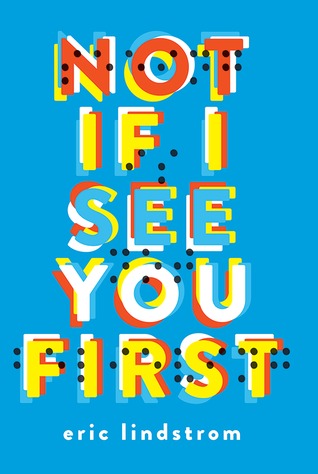This month's book is Not If I See You First by Eric Lindstrom.

Don’t deceive me. Ever. Especially using my blindness. Especially in public.
Don’t help me unless I ask. Otherwise you're just getting in my way or bothering me.
Don’t be weird. Seriously, other than having my eyes closed all the time, I’m just like you only smarter.
Parker Grant doesn’t need 20/20 vision to see right through you. That’s why she created the Rules: Don’t treat her any differently just because she’s blind, and never take advantage. There will be no second chances. Just ask Scott Kilpatrick, the boy who broke her heart.

When Scott suddenly reappears in her life after being gone for years, Parker knows there’s only one way to react—shun him so hard it hurts. She has enough on her mind already, like trying out for the track team (that’s right, her eyes don’t work but her legs still do), doling out tough-love advice to her painfully naive classmates, and giving herself gold stars for every day she hasn’t cried since her dad’s death three months ago. But avoiding her past quickly proves impossible, and the more Parker learns about what really happened—both with Scott, and her dad—the more she starts to question if things are always as they seem. Maybe, just maybe, some Rules are meant to be broken.
Combining a fiercely engaging voice with true heart, debut author Eric Lindstrom’s Not If I See You First illuminates those blind spots that we all have in life, whether visually impaired or not.
Highlights: I like that this is a novel whose protagonist is blind, but it's not about her blindness. She's just a normal spunky teenage girl who is navigating friendship and love the way any of us do. Cluelessly!
Notes for writers: I noted how much dialogue was used pretty quickly. While I was initially concerned that the novel would suffer due to a lack of imagery and interiority, I quickly came to believe that the heavy use of dialogue enhanced the work. There was enough interiority to keep me connected to the protagonist and the lack of visual imagery made sense in this case as the protagonist is blind (a fact that we mostly forget when so heavily immersed in dialogue and comes back occasionally when grounded in interiority).
A great read for: Anyone who wants to see someone who has been knocked down a bit get back up and fight for love and friendship.
Happy spring & happy reading! *Note: I received an arc of this and reviewed that copy.


No comments:
Post a Comment